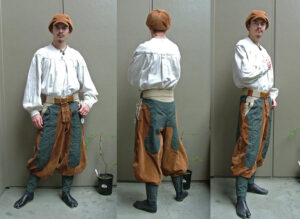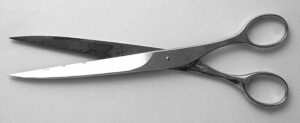
Photo credit: Marcusstratus CC by NC SA 3.0
by Debbie Burke
The English language is full of quirks that are downright puzzling.
Take, for instance, the term a pair of pants.
Okay, a pair of shoes, a pair of glasses, a pair of aces—they all make logical sense. Two related objects make a pair.
But when was the last time you saw someone wearing a single pant?
Where did that weirdness come from?
According to Quora, it originated when people wore pantaloons, which were two separate pieces of clothing, put on one leg at a time. Eventually someone sewed them together, creating a singular garment, but the plural term stuck. The first recorded use of pants was in 1835 as a slang abbreviation for pantaloons.
Britannica says scholarly references don’t back up the sewn-together theory. Instead, they use the term, plurale tantum.
The Oxford English Dictionary defines plurale tantum, which is Latin for “plural only,” as a “noun which is used only in plural form, or which is used only in plural form in a particular sense or senses.” Bifurcated items (things that can be divided into two), such as pants, fall into this category. Think of items that are usually referred to in plural—often preceded by “pair of” or something similar, even when there is only one item: pliers, glasses, scissors, sunglasses, tweezers, etc. So, pants is a type of noun that is used only in its plural form, even when there is only one item being discussed.
I dunno if I buy the plurale tantum argument. Back in the 1800s, few people could read, let alone comprehend Latin. I tend to believe the sewn-together legend as the more likely origin.
Since TKZ readers and wordsmiths focus on crime writing, let’s look at a couple of plurale tantum examples that are used as weapons.

Photo credit: Wikimedia
According to Merriam-Webster, a pair of scissors originated from “Vulgar Latin”:
…caesorium referred to a cutting instrument, and this Latin word was singular—even though the cutting instrument it named had two blades that slid past each other. When the word was borrowed into Middle French, French speakers gave it both a singular form (cisoire) and a plural form (cisoires). The plural didn’t refer to multiple cutting implements, however; it was modeled on the two blades of a single caesorium.
We began calling an individual scissors a pair to emphasize the matched cutting blades. There’s precedent for it. Before we called them scissors, we called them shears, and pair was used with shears for about 100 years before scissors arrived on the scene.
Alfred Hitchcock chose a pair of scissors as the weapon in his 1954 classic, Dial M For Murder.

Photo credit: Kandy Talbot CCA by 3.0
Another possible weapon is a pair of pliers.
The versatile tool was likely developed in Europe during the Bronze Age to handle and shape hot metal. An early Greek illustration shows the god Hephaestus at a forge using pliers.
Wikipedia says Hephaestus is “the Greek god of artisans, blacksmiths, carpenters, craftsmen, fire, metallurgy, metalworking, sculpture and volcanoes.”
In the 1973 film Charley Varrick, Walter Matthau and cohorts rob a bank that turns out to be a repository for mob money. Mobsters go hunting for Matthau’s gang. In the scene below, a villainous character tries to obtain information from a hapless banker who was in on the heist. The villain threatens torture with “a pair of pliers and a blowtorch.”

Photo credit: Wikimedia Commons
According to the British Film Institute, Charley Varrick influenced director Quentin Tarantino who coopted the line about pliers and a blowtorch for Pulp Fiction (1994), delivered by the menacing Ving Rhames.
Warning: this link contains offensive language.
Digging deeper into pluralia tantum, here are some examples where the singular meaning is different from the plural:
Arm is a limb. Arms are weapons.
Brain is an organ. Brains are intelligence.
Custom is a traditional event. Customs is the government body that collects taxes on imported goods.
Damage is harm done to something. Damages are monetary compensation for harm.
Gut is the bowel. Guts are courage.
Enough linguistics for today. Let’s wrap up with some amusing inconsistencies in the English language.
In school, we learned “I before E except after C, or when sounded like A as in neighbor and weigh.”
Then along comes a smarty pants to turn that rule on its head:

Sign outside bookstore:
I before E…Except when your foreign neighbor Keith receives eight counterfeit beige sleighs from feisty caffeinated weightlifters. Weird.
~~~
TKZers: which peculiarity of the English language baffles you the most?

” I before E…Except when your foreign neighbor Keith receives eight counterfeit beige sleighs from feisty caffeinated weightlifters. Weird. ”
Someone will doubtless point out that the sign contains 5 words covered by the “said like A” exception: neighbor, eight, beige, sleigh, and weightlifters.
Also, there’s the baffling question of why we park on driveways and drive on parkways. I seized the handrail, but fell on my keister at Easter, tho I didn’t fall from a great height.
Bravo, J!
Your brain works better than mine does this early in the morning. That’s not surprising since everyone knows you have brains.
Ah, this reminds me of a favorite Alan Sherman song, “One Hippopotomi”
One hippopotami cannot get on a bus,
Because one hippopotami is two hippopotamus
And if you have two goose, that makes one geese
A pair of mouse is mice A pair of moose is meese
A paranoia is a bunch of mental blocks
And when Ben Casey meets Kildaire, that’s called a paradox
When two minks fall in love, with all their heart and soul,
You’ll find the plural of two minks is one mink stole
Singulars and plurals are so different, bless my soul
Has it ever occurred to you that the plural of half is whole?
A bunch of tooth is teeth a group of foot is feet
And two canaries make a pair, they call it a parakeet
A paramecium is not a pair
A parallelogram is just a crazy square
Nobody knows just what a paraphernalia is
And what is half a pair of scissors, but a single sciz?
With someone you adore, if you should find romance,
You’ll pant, and pant once more, and that’s a pair of pants!
Source: LyricFind
Terry, that’s hilarious! Thanks for sharing it.
It’s sung to the tune of “What Kind of Fool Am I?”
Here’s a link to a YouTube version: https://youtu.be/umlBrQoG6xk
Viri infected my lungs. Viruses infected my computer. For that matter, mice are in the garage, mouses in the computer lab.
Good ones, Alan. Thanks for stopping by.
Great post, Debbie. Thanks for starting our day with some humor.
It’s too early for me to find answers to your question. I’m just starting my coffee.
Apparently the plural, pants, has been applied to jeans, Levi’s, and slacks. And can you imagine wearing an under short before it became undershorts?
Have a great day!
Back atcha, my friend. Feel free to come back after the coffee kicks in.
What a delightful post!, Debbie!
Dial M for Murder is one of my favorite movies. I haven’t watched it for a while, but the attempted murder scene is so suspenseful as the camera pans around Grace Kelly.
Too early for me to come up with my own English humorism, but I did Google something. According to kinney brothers.com, “The plural gender neutral form of nieces and nephews is ‘niblings’.” Makes sense.
Niblings? That’s a new one. Thanks, Kay!
Reminds me of a dog we used to have who would use her front teeth to nibble corn from the cob while we held the ear for her (of course).
“If the English language made any sense, a catastrophe would be an apostrophe with fur.” – Doug Larson
Oh that’s a hoot! Thanks, Jim!
You got me started, Debbie!
“Clip” can mean to cut apart, or to hook together.
And where we place emphasis on a word: ADDress is a location. To addRESS someone is to speak to them.
And those pesky plurals: child, foot, tooth, etc. Why can’t we just add an “s” on the end of them(s) and be done with it?
Full disclosure: I looked these up because my brain(s) is fried today.
🙂
Deb, thanks for these good examples of the language that often makes little sense (or is it cents?).
Thsn you have a odd names for things like a group of apes is a shrewdness, a skulk of Foxes, bees are a swarm, bears gather in a sounder. A group of cheetahs are a coalition. Crows gather in a murder. Dolphins a pod and eagles in a convocation. Fish become a school and Flamingos a stand, and of course that gaggle of geese we can’t forget. Most dogs are in packs while kangaroos form a mob, but the mighty lions gather in a pride. Could you even imagine manta rays swimming in a squadron while owls gather in a parliament with a covey of partridges beneath them. There are a lot more gatherings that just don’t make sense. And we wonder why people from other countries have difficulty learning the English language.
Great article on the pluralities that make minimal sense.
Barbara, what a great collection of critter groups. Now you’ve piqued my curiosity to research those origins. If I go down a bunch of rabbit holes, will I find fluffles?
Thanks for stopping by!